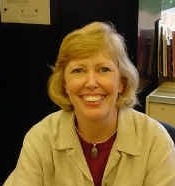WAC/CAC in Secondary Schools: What Keeps Us Going?
 Pamela B. Childers, Secondary School Issues Editor
Pamela B. Childers, Secondary School Issues Editor
Home Page: http://www.mccallie.org/pchilder/
Email: pchilder@mccallie.org
Some days I wonder what keeps me going between teaching, writing conferences with students, reading and preparation for classes and workshops, collaboration with colleagues on projects, and deadlines for reports, articles and reviews for publications. But I don't wonder for long because I run into colleagues in every discipline who have workloads that defy the 24-hour day. If we are serious about our profession, then we probably have accepted responsibilities and self-motivated projects because of interest in improving student learning and our own teaching. Knowing there are others who do the same thing with WAC/CAC keeps us going.
Just last week I visited a secondary school to assess their new writing center and WAC program. Sitting in on classes, leading workshops, and talking with students and teachers made me reflect on and appreciate my own teaching environment. The dedication of the teachers, the openness of the students, and the free exchange of ideas between the two groups moved me. Every teacher had a workload that amazed me, yet they came to class prepared, they introduced me to new professional articles and books, they freely participated in writing workshops, and they discussed ideas they had about teaching and learning. What makes the idea of this program work? Certainly it is the teachers and their relationship with students, but it is also a supportive administration that makes it all happen. Teachers seem to be trusted to do what they say they will do, they are encouraged to develop as teachers and learners, and the administration gives them financial and philosophical support.
How does this happen? It is not easy to find and keep good teachers or good administrators. However, they seem to work together—a good administrator hires an outstanding teacher or an administrator hires a potentially great teacher and nurtures that potential through an effective faculty development or mentoring program. No school is perfect; most are far from it. But there is an atmosphere of mutual trust, a curiosity for learning, a communication among faculty, students and administrators that becomes apparent to another visiting educator.
We all need to visit our colleagues at other schools or even to exchange classes for a day, week or semester. I know this sounds far fetched, but it can happen. One of my colleagues followed a student at a nearby school for a regular school day. He was exhausted, bored, confused, and frustrated by the end of the day. When he returned to his own classes, he was convinced that his own students probably feel the same way at the end of the day. He communicated this information to some of us involved in WAC, and we talked about ways that we involve our students in learning throughout the day. This exchange invigorated all of us, even at the end of a hectic day.
What else keeps us going? Talking about students and their learning. I am not talking about the lunchroom gossip such as, "Johnny is such a pain in my class." I am talking about a phone call, email or face-to-face exchange in a hallway about a concern with Johnny's learning or a delight in Johnny's insightful response to a classroom prompt. There is also a formal structure of discussion on student learning, in a Critical Friends Group, mentor group, or even departmental meetings focusing on a particular concern such as student writing in a specific discipline. At conferences, workshops and concurrent sessions offer teachers an opportunity to take risks with a facilitator who encourages the development of ideas to take back to their own classroom. Collaboration and exchanges of ideas with other professionals energize us.
Finally, I must confess to the birth of this article. It began as an idea before I went on my visitation, but now I am sitting here with my colleague, who is giving me new ideas, telling me about experiences at WAC conferences, and reminding me of my own excitement in learning. It is not easy to find both a respected and critical ear to listen to our ideas and give us honest feedback. Maybe we just need to take time to reflect on why we teach and why we take on new and challenging tasks. After all, that's what keeps us going; that's what keeps us learning.
Publication Information: Childers, Pamela B. (2001). WAC/CAC in Secondary Schools: What Keeps Us Going? Academic.Writing, https://doi.org/10.37514/AWR-J.2001.2.1.05
Publication Date: December 1, 2001
DOI: 10.37514/AWR-J.2001.2.1.05
Copyright © 2001 Academic.Writing.